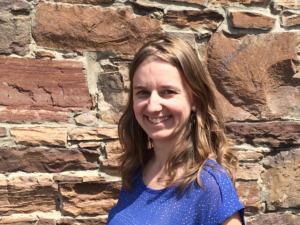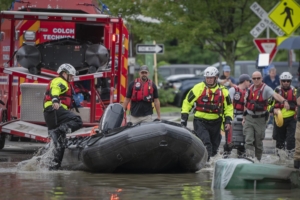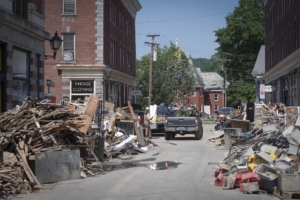
O n July 11, 2023, much of the state of Vermont, USA, including the capital city of Montpelier, my home town, found itself under water after the worst flood since 1927. This event, happening right down the street from my hilltop neighborhood, brought me to a whole new level of understanding of the climate situation – from intellectual to experiential. The area was flooded with water, but also with emotions, information, options, connections and determination. Acknowledging the privileged position I am writing this from, it is with much humility that I share some of the lessons I learned to prepare for the next, inevitable, climate disruption.
 Alexandra Arnold | USA
Alexandra Arnold | USA
Alex Arnold (she/her) MSPsy, MSHR/ OD, ACC, is Executive Consultant for The Taos Institute and a climate resilience coach at Alma Coaching, where she uses positive psychology and Appreciative Inquiry to help introverted and highly sensitive people shift from climate anxiety to inspired action.
Emotions
Trepidation, denial, shock, fear, anxiety, sadness, anger and restlessness – they’re only a few of the emotions I experienced. For several days, I felt numb, unable to focus or make even the simplest decision. In addition, I felt guilty, selfish, ashamed, weak and inadequate for the way I was handling the situation: the voice of the “inner critic” that we all have.
And there was grief. The realization of all the losses kept coming: property and road damage, trash and pollution, destruction of nature, including farm crops, animal habitats, trails, rivers and lakes. And other losses: of habits, hobbies, lifestyles, plans, many associated with local venues or seasonal weather.
The VT Small Business Administration stated: “local businesses are part of our routines; they anchor our lives in communities – where we shop, stop for coffee, eat, especially in small-town centers that struggle to maintain quaint, quality, personal service. But the landscape will change. Business owners may not want or be able to rebuild exactly as it was. Let’s give them some breathing room and open ourselves to a new normal.”
At a deeper level, there has been a loss of safety, control and identity.
What you can do to prepare:
Learn to shift out of fight-flight-freeze mode (for example, with breathing techniques) before a crisis hits. Familiarize yourself with the Emotion Wheel so that you can “name it to tame it”. Get used to talking about grief. Know your preferred self-care tools. Practice catching your inner critic. Increase self-compassion. Prioritize regular sleep, healthy nutrition and exercise to approach challenges with a strong mind and body.
Let go. With so much to lose on the outside, we are better off finding anchors of peace, joy and identity on the inside by shifting from consuming and doing to being.
Information
As the rain poured, so did the news. Weather updates. Road closures. River levels. Aerial photos. Video clips. News broadcasts. Community forums. Text messages, emails, phone calls from friends and family. Ongoing dings and beeps from notifications. The information overload and compulsive need to browse the web for the latest update added to the feeling of being overwhelmed. Is constant access to the internet helping or harming? What is the experience like for those who are not connected, by choice or not, or for those who have lost connection?
What you can do to prepare:
Develop healthy relationships with your electronic devices. Set limits to your information intake. Know when to stop, to preserve your mental energy. Adjust your notifications. Spend time away from your phone and computer. Have a backup plan for staying informed without power or connectivity.
Learn to recognize information overload and practice zooming in. Bring your attention to very small things you are grateful for. Make a list of what you can control. Go through the day five minutes at a time.
Focus on the present by developing a mindfulness practice. This can be as simple as focusing on one of your senses (touch, sight, sound, etc.) for a few minutes, several times a day.
Options
Some say that “action is the antidote to despair”. Indeed, it was tempting to jump into action and help. Instead, Senator Bernie Sanders asked us to wait: “I know many will want to help your fellow Vermonters during this difficult time. We are still in the very early stages of this disaster and responders are focused on evacuations and preventing loss of life. […] Do not self-deploy to affected areas as you could put yourself at risk. This recovery will be long.”
Rushing into immediate action can be a way to cope with feelings of helplessness in the moment but may not be the most useful or sustainable. In fact, adding to the congestion, crowds and chaos of a disaster scene may interfere with professional first responders. Should I give food, clothing, generators, clean up debris, make a donation, or all of the above? When faced with so many options, it is worth taking the time to ask how we can best contribute with our own unique skills.
What you can do to prepare:
Be patient. Follow official guidelines from agencies that are actually trained and equipped to organize relief efforts. It may seem slow, and the system is imperfect, but they know best how to dispatch resources, allocate funds and prioritize tasks.
Know your values and strengths – no need to jeopardize your safety, health or to aggravate being mentally overwhelmed by working on a disaster site if that is not the best match for you. Know what you care about and what you are good at so that when the time comes, you can have the greatest impact.
Be creative – think outside the box, not just about the obvious ways to help. What you see in the news may bring attention to a certain population/area, but what about other locations – caring for first responders, animals, the homeless? What about the long-term and indirect impacts?
Connections
Facing a natural disaster can be very isolating. Not just physically, but because our friends and family, even when well-intentioned, can do more harm than good with light-hearted comments such as “after the rain always comes the sunshine!”, “well it’s great for kayaking!” or “I wish I had a power outage so I could get a break!” or overly dramatic responses such as “should I fly over to help?”.
On the other hand, spending a few hours at a friend’s house, catching up with neighbors when walking the dog, receiving a call from a supervisor who is just checking in, reaching out to a friend who has lived through a similar event for support, or hearing of the huge volunteer turn-out and feeling the community spirit – these connections are invaluable. The VT July Flooding Crowd-Sourced Resource List, a 23-page shared Google document consolidating essential information, is an example of how neighbors mobilized in just a few days.
What you can do to prepare:
Learn how to support someone in a crisis: provide practical advice, be a sounding board, offer distraction or humor, give them space. Be curious, listen to what they truly need, not what you want to give. If you are on the receiving end, be clear about what you need and ask for it.
Spend your time with people who lift you up, not bog you down. Know your friends, know who to reach out to and for what reason when you need it. It is not realistic to keep in touch with everyone.
This year the US Surgeon General issued a public health advisory about the epidemic of loneliness in the US. Build a relationship with someone who is geographically isolated or not connected online so that they know they have someone to count on when the time comes.
Determination
In the days following the flood, emails from local organizations provided much needed messages of hope: Paul Burns, executive director of Vermont Public Interest Research Group said, “Today, as I grieve the losses we’re suffering in my beautiful small city of Montpelier, I’m also determined. I’m determined to do everything I can today and until my last breath, to hold those who created this climate mess responsible”.
Sue Minter, executive director of Capstone Community Action noted, “We see with heavy hearts the destruction of housing and businesses that are desperately needed to keep our communities strong. We have done this before and we can do it again because we are #VtStrong!” Reverend Joan from the Unitarian Church of Montpelier wrote, “I have been buoyed by the calls, text messages, and emails of support I have received from colleagues and congregations near and far. This community has faced a lot together, including major flooding in 1927, 1992, and 2011. In all those times, we have come together with patience, compassion, and care. Let us do so again now.”
The Ananda Gardens Family, a local community-supported agriculture (CSA) farm, shared, “We pray for all of us to breathe deeply in this time of fear, loss, and uncertainty. May the songs of the birds remind us that cycles of nature are both beautiful and beyond our control. May the sunshine allow us to see beyond sorrow and despair with hope in our hearts to count the blessings of life, community, and love.” More messages included references to how VT made it through Hurricane Irene, Covid and other challenging times.
What you can do to prepare:
Build a repertoire of positive news (for example, Karuna News, BBC Future Planet, The Bright Spot) to be reminded of what’s going right in the world so that, in a time of crisis, you can remember and spread success stories and messages of hope and resilience.
Sign up for the newsletter of a few organizations you value in your area. Those emails from leaders you trust, rather than random statements found on the web, will feel personal and provide a much-needed sense of belonging to a local community.
There is no perfect way to navigate the sudden disruptions caused by climate change. Yet there are lessons to be learned in these events. Developing emotional intelligence, designing a life of meaning rather than consumerism, being your true self to make the greatest impact, shifting from individualistic to collective thinking and balancing news of destruction with stories of hope … these are steps we can all take now to be as prepared as possible to face the inevitable next challenge.
Intro by Keith Storace
In July this year, the Winooski River in Montpelier, Vermont, USA reached a peak of 21.35 feet, leading to significant flooding. In the third instalment of her four-part series titled “A Practitioner’s Journey to Living with Climate Change,” Alex Arnold offers first-hand experience into the flood’s effects on her local community. The article, “We Can’t Predict or Prevent, But We Can Prepare,” delves into the emotional, informational and hands-on struggles she, and those around her, experienced during this disaster, providing insights into how we can ready ourselves emotionally, mentally and practically for impending climate disruptions.




